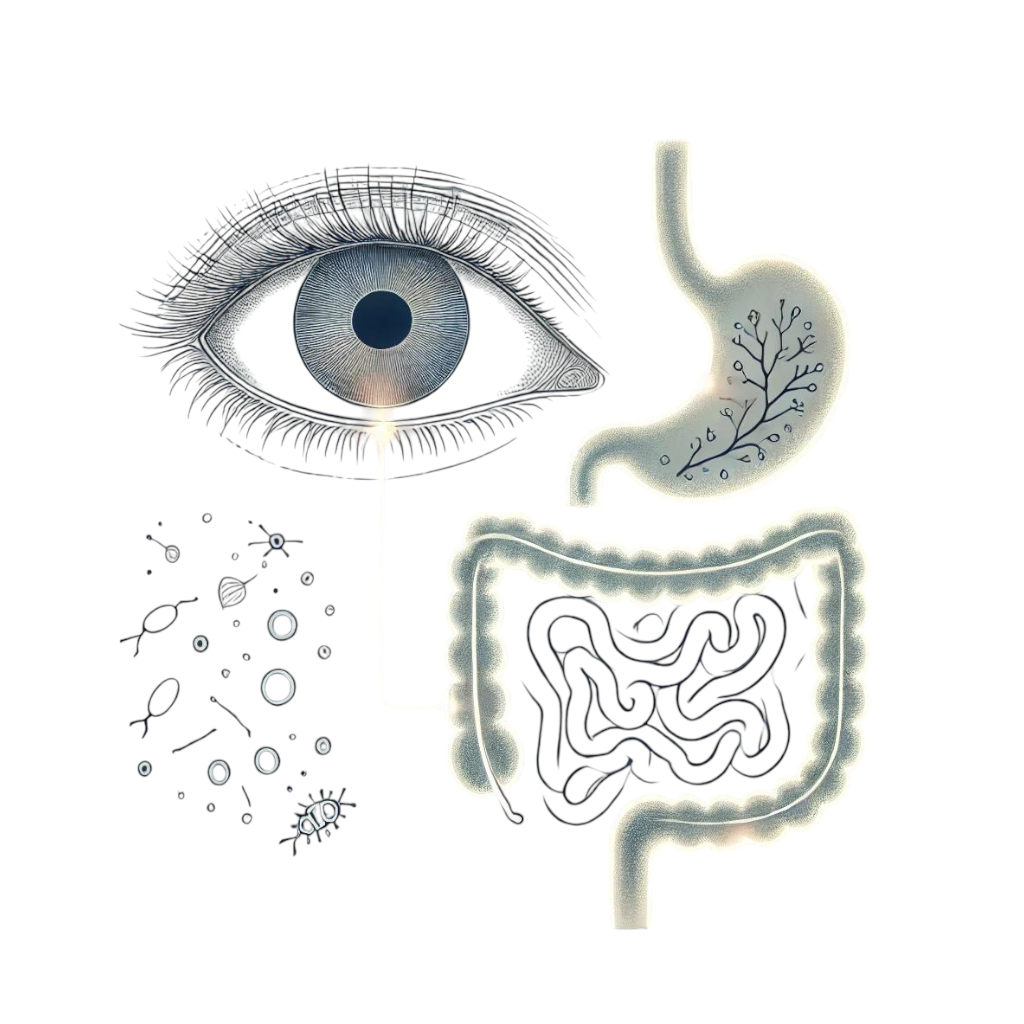The Role of the Gut Microbiome in Age-Related Macular Degeneration: A Comprehensive Review
How Does the Gut Microbiome Affect Age-Related Macular Degeneration (AMD)?
Can Microbiome-Targeted Products Slow Down AMD Progression?
What Are the Links Between Gut Dysbiosis, Inflammation, and AMD?
Abstract Age-related macular degeneration (AMD) is a leading cause of blindness worldwide, with increasing evidence suggesting a strong link between gut microbiota and retinal health. The gut microbiome regulates immune function, inflammation, and oxidative stress, all of which contribute to AMD pathogenesis. This review synthesizes current knowledge on the gut-retina axis, microbiota dysbiosis in AMD, and potential therapeutic interventions, including probiotics, dietary modifications, and microbiome-targeted therapies. Understanding these interactions may offer novel strategies for preventing and managing AMD through gut microbiome modulation.
1. Introduction AMD is a progressive retinal disease that primarily affects older adults, leading to central vision loss and significant impairment in daily activities. While genetic and environmental factors play key roles, emerging research highlights the gut microbiome as a major contributor to AMD pathogenesis. The concept of the gut-retina axis, where gut microbial composition influences retinal health, has gained attention in recent years. This review explores the interplay between gut microbiota and AMD, emphasizing potential therapeutic strategies to mitigate disease progression.
2. The Gut-Retina Axis: Mechanisms Linking the Microbiome and AMD
2.1 Microbial Influence on Systemic and Ocular Inflammation
Chronic inflammation is a hallmark of AMD, and gut dysbiosis has been linked to increased systemic inflammation. Microbial imbalances lead to the overproduction of pro-inflammatory cytokines, such as TNF-α and IL-6, which exacerbate retinal degeneration. Additionally, lipopolysaccharides (LPS) derived from harmful gut bacteria can activate the immune system, triggering retinal damage.
2.2 Oxidative Stress and AMD Progression
Oxidative stress plays a crucial role in AMD development. Dysbiotic gut microbiota contribute to an imbalance in reactive oxygen species (ROS), leading to retinal cell damage. Beneficial gut bacteria, such as Lactobacillus and Bifidobacterium, help mitigate oxidative stress by producing antioxidant metabolites, but their reduced presence in AMD patients exacerbates disease progression.
2.3 Complement System Activation
The complement system, a critical component of immune defense, is dysregulated in AMD. Studies have shown that specific gut microbial communities influence complement activation, with altered gut microbiota profiles correlating with increased AMD risk. Understanding these relationships may open doors for microbiome-based interventions.
3. Gut Microbiota Dysbiosis in AMD Patients
3.1 Changes in Microbiota Composition
AMD patients exhibit distinct gut microbiome profiles characterized by:
- Reduced beneficial bacteria, including Firmicutes and Bacteroidetes, which maintain gut barrier integrity and immune homeostasis.
- Increased pathogenic bacteria, such as Proteobacteria and Escherichia coli, associated with systemic inflammation.
- Altered microbial metabolites, including decreased levels of short-chain fatty acids (SCFAs), which play a protective role in retinal health.
3.2 Microbiota as a Biomarker for AMD Risk
Emerging studies suggest that gut microbiota composition could serve as a biomarker for AMD progression, allowing for earlier detection and personalized intervention strategies.
4. Therapeutic Potential: Modulating the Gut Microbiome for AMD Management
4.1 Probiotics and Prebiotics
- Probiotics, including Lactobacillus rhamnosus and Bifidobacterium breve, have been shown to reduce oxidative stress and inflammation in retinal cells.
- Prebiotics, such as dietary fibers, support the growth of beneficial gut bacteria, improving gut health and potentially slowing AMD progression.
4.2 Dietary Interventions
A Mediterranean diet, rich in fiber, omega-3 fatty acids, and polyphenols, has been linked to improved gut microbiota diversity and reduced AMD risk. Nutrients like lutein, zeaxanthin, and vitamin E may further enhance retinal protection by modulating gut microbiota composition.
4.3 Fecal Microbiota Transplantation (FMT)
FMT, the transfer of healthy gut microbiota to AMD patients, is being explored as a potential therapy. Preliminary studies indicate that restoring microbial diversity may help regulate immune responses and oxidative stress in the retina.
4.4 Microbiome-Targeted Drug Development
Recent advancements in postbiotics and synbiotics hold promise for AMD management. These microbiome-targeted treatments aim to restore microbial balance while reducing inflammation and oxidative damage.
5. Future Directions and Conclusion The gut microbiome represents a novel avenue for AMD research and treatment. Future investigations should focus on:
- Longitudinal studies to establish causal relationships between microbiome changes and AMD.
- Personalized microbiome-based interventions tailored to AMD risk profiles.
- Clinical trials assessing the efficacy of probiotics, prebiotics, and FMT in AMD patients.
By leveraging microbiome science, researchers and clinicians may develop non-invasive, microbiome-targeted therapies to prevent and slow AMD progression, offering new hope for millions affected by this debilitating condition.
References
https://www.frontiersin.org/journals/cellular-and-infection-microbiology/articles/10.3389/fcimb.2023.1225859/full
https://www.frontiersin.org/journals/microbiology/articles/10.3389/fmicb.2023.1069325/full
https://www.frontiersin.org/journals/cellular-neuroscience/articles/10.3389/fncel.2024.1468187/full
https://www.frontiersin.org/journals/cellular-and-infection-microbiology/articles/10.3389/fcimb.2021.759333/full
https://www.frontiersin.org/journals/microbiology/articles/10.3389/fmicb.2021.726792/full
https://www.frontiersin.org/journals/medicine/articles/10.3389/fmed.2024.1377186/full
https://pmc.ncbi.nlm.nih.gov/articles/PMC10113553/
https://pmc.ncbi.nlm.nih.gov/articles/PMC8795667/
https://www.frontiersin.org/journals/endocrinology/articles/10.3389/fendo.2023.1205846/full
https://www.frontiersin.org/journals/immunology/articles/10.3389/fimmu.2020.609765/full
https://www.frontiersin.org/articles/10.3389/fmicb.2023.1069325/full
https://www.nature.com/articles/s41525-020-00141-0
https://www.ncbi.nlm.nih.gov/pmc/articles/PMC8151249/
https://iovs.arvojournals.org/article.aspx?articleid=2792766
https://www.nature.com/articles/srep40826
https://pmc.ncbi.nlm.nih.gov/articles/PMC8566696/
https://pmc.ncbi.nlm.nih.gov/articles/PMC11432523/
https://pmc.ncbi.nlm.nih.gov/articles/PMC10513115/
https://pmc.ncbi.nlm.nih.gov/articles/PMC10650403/
https://pmc.ncbi.nlm.nih.gov/articles/PMC11367437/
https://pmc.ncbi.nlm.nih.gov/articles/PMC10488056/
https://pmc.ncbi.nlm.nih.gov/articles/PMC10352852/
https://pmc.ncbi.nlm.nih.gov/articles/PMC11077909/
https://pmc.ncbi.nlm.nih.gov/articles/PMC7942081/
https://pmc.ncbi.nlm.nih.gov/articles/PMC8168766/
https://pmc.ncbi.nlm.nih.gov/articles/PMC11464360/
https://pmc.ncbi.nlm.nih.gov/articles/PMC10445766/
https://pmc.ncbi.nlm.nih.gov/articles/PMC11367437/
• How does the gut microbiome affect age-related macular degeneration (AMD)?
• What is the gut-retina axis and its role in AMD?
• Can gut bacteria influence eye diseases like AMD?
• What are the links between microbiome dysbiosis and AMD progression?
• How does inflammation from gut microbiota contribute to AMD?
• Can probiotics and prebiotics help prevent AMD?
• What is the role of fecal microbiota transplantation (FMT) in AMD treatment?
• How does oxidative stress in the gut impact retinal health?
• What dietary changes support a healthy microbiome for AMD patients?
• Is there a connection between intestinal permeability (leaky gut) and AMD?
• Can microbiome-targeted therapies slow down AMD progression?
• What are the latest research findings on gut bacteria and AMD?
• Does the Mediterranean diet help with AMD by altering gut microbiota?
• How does the microbiome modulate immune responses in AMD?
• What are the best microbiome-friendly foods for retinal health?
• Can AI help analyze the gut microbiome for AMD risk prediction?
• How does gut dysbiosis increase oxidative stress in AMD patients?
• What are the future therapeutic strategies targeting the microbiome for AMD?
• What role do short-chain fatty acids (SCFAs) play in retinal health?
• Can gut microbiome analysis be used as a biomarker for AMD progression?


Leave a comment
This site is protected by hCaptcha and the hCaptcha Privacy Policy and Terms of Service apply.